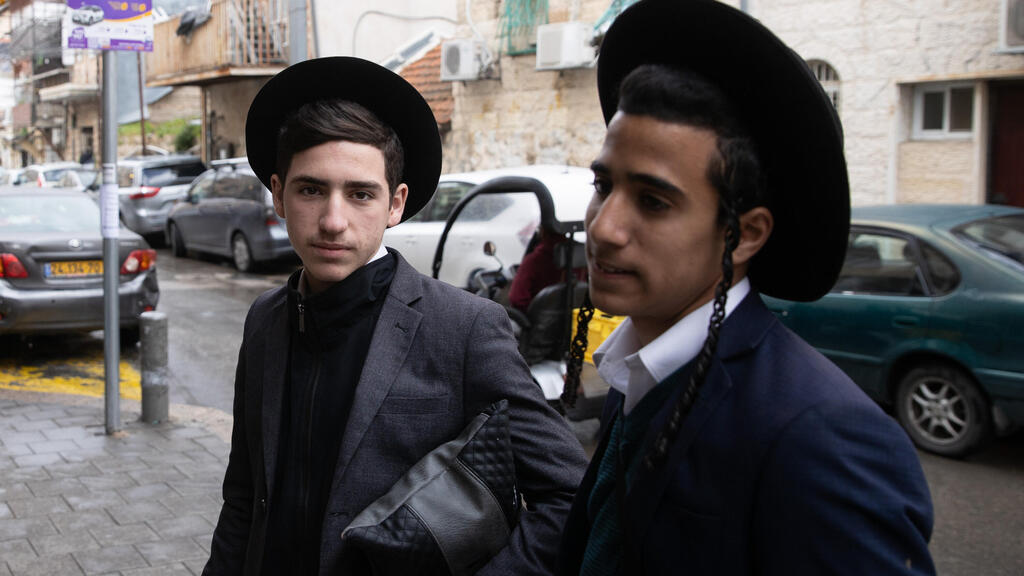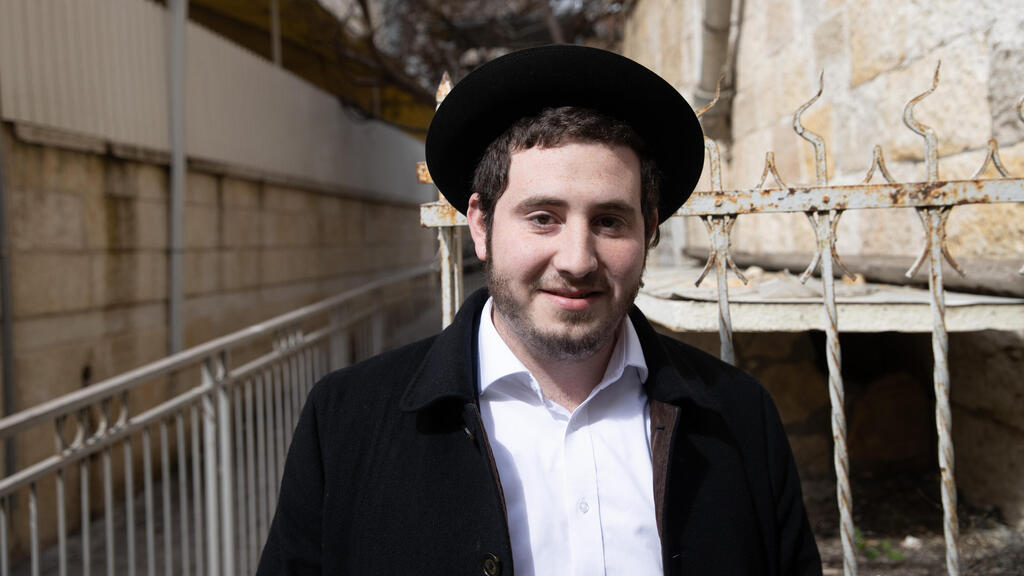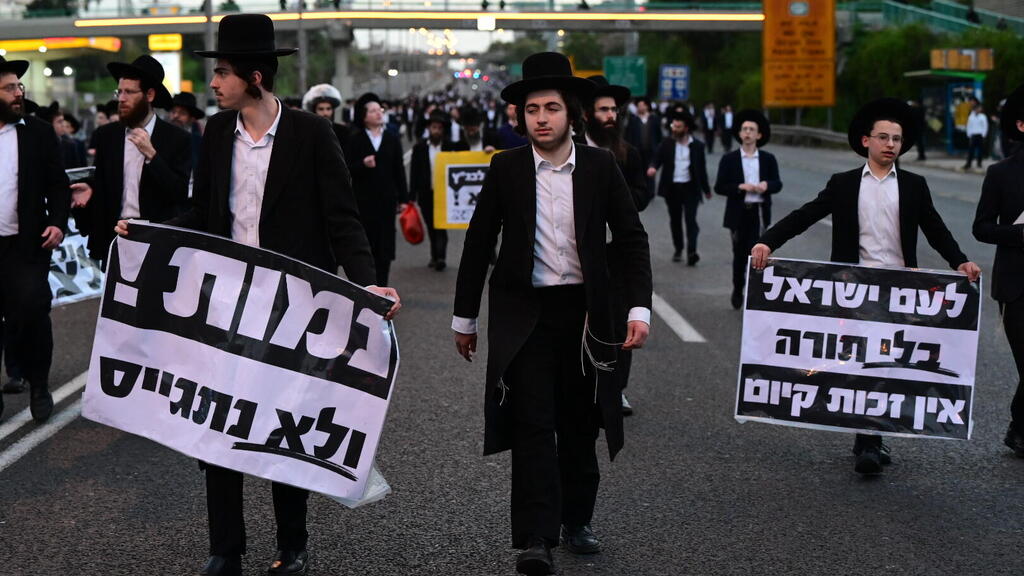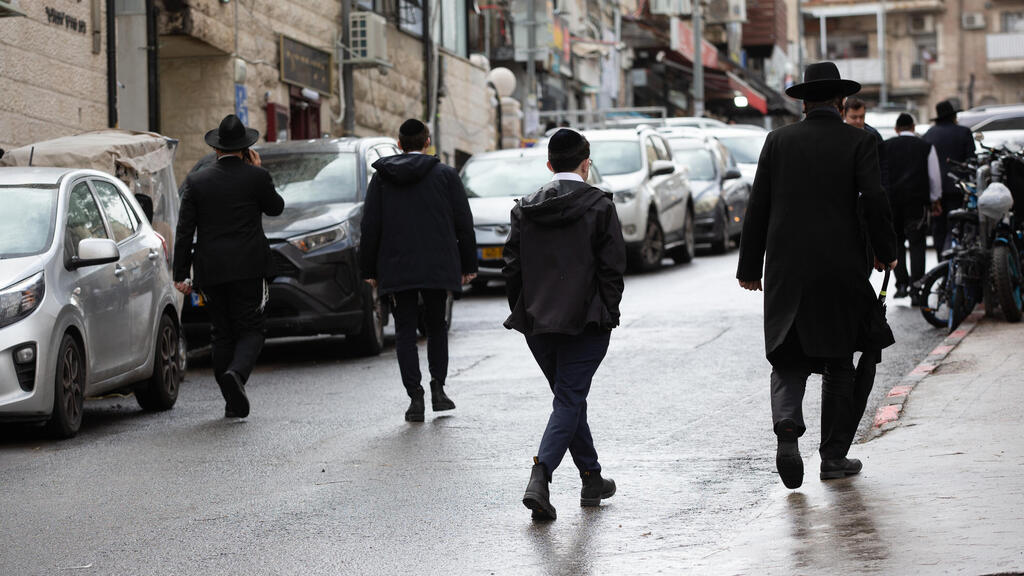The temporary order promoted by the government coalition to avoid the conscription of yeshiva students will expire at the end of the month, and the question of a new conscription law is causing a stir in Israel.
Read more:
But, while ultra-Orthodox men from the radical Jerusalem Faction demonstrated and blocked Highway 4 on Sunday in protest against conscription, it seems that the ultra-Orthodox neighborhoods of Jerusalem and Bnei Brak, for the time being, are not moved by the public debate, which has not yet been translated into actual decisions.
4 View gallery


Shlomo talks to Ynet about conscripting Haredim into the IDF
(Photo: Alex Kolomoisky)
Shlomo, a yeshiva student from Jerusalem, told Ynet that "some must be mobilized and some must learn Torah, but if they pass a law that Haredim must be mobilized there will be no one to guard the world of Torah."
He says there are currently enough soldiers fighting. "I want to study. Conscripting is not my way, not my direction. My grandfather and my great-grandfather were in the army because there was a lack of soldiers, but today there are already enough soldiers who fight and less on the spiritual side. If they take away the power of the Torah, it will not help to win. It doesn't go together," he explained.
"I have uncles who were in yeshiva and then went to the army and no trace of religion remains. Those who go to the army do not stay in the Torah. It's a different way of life."
Lasry, Shlomo's friend, also says that Torah studies should be conducted alongside military service, and even claimed that they protect the soldiers. "They are our security, but the Torah is their security. You see that there are miracles and it's not for nothing, you don't make a mistake and a soldier is saved. Everyone who is saved is thanks to a page of Gemara that I studied," he asserted.
'Only after the war'
Bika, a 28-year-old ultra-Orthodox man who served in the army, emphasizes the importance of enlisting and explains that not all yeshiva students study Torah. "I enlisted. I understood that it was my time to bear the burden, so I went and enlisted and did my part as is expected of everyone," he said.
"It's like some outstanding athletes who don't go to the army - so that's what yeshiva students are like. Those who study Torah should continue to sit and study Torah all day, but those ultra-Orthodox who are on the margins and don't study all day should serve like everyone else."
He claims, however, that having this discussion during the war creates division. "Now we need to deal with unity, this is not the time to bring the issue to the headlines. There are differences of opinion and, of course, this question comes up, but I don't think this is the time," he said.
He explains that "if a law is passed now that requires all the ultra-Orthodox to be mobilized, it will not be useful for the current military campaign, perhaps for future ones. In order for the entire nation to be united, we need to wait, discuss it when the time comes and then also adapt the military system to the ultra-Orthodox sector at the same time as those who reverse course and say 'Let's carry the burden.'"
Hezki Schechter, a 30-year-old ultra-Orthodox man from Bnei Brak who was discharged from reserve service about two weeks ago, says that the ultra-Orthodox should be integrated into an appropriate framework.
"The IDF Haredi Directorate does not know how to recruit ultra-Orthodox. They want the Haredi guy to enter the melting pot and in the army, it won't work anymore. We thought that we would see more Haredim in the recruitment center after October 7, but that didn't happen, and there is no point in promoting the law because the army doesn't have the proper tools to deal with thousands of ultra-Orthodox," he explained.
"Even if the law is passed, the ultra-Orthodox will not enlist. I think that an ultra-Orthodox man who is undecided should go to the army, this is important both as a human being and as a contribution to Israeli society. But I also know that the ultra-Orthodox will not enlist, I live among them. As an ultra-Orthodox man who joined the army and finished the reserves, I have the privilege to say that," he said.
Recruiting ultra-Orthodox - for an army without women
Among those opposed to Haredi conscription, Asher, a 63-year-old Belz Hassid from Bnei Brak, stands out in his position, claiming that "conscription is completely forbidden and can never happen as long as there are women in the army." He adds that "there are several problems with recruiting ultra-Orthodox men to the army. The women destroy it from the inside. They reduce the motivation to fight and also cause incest. According to the Torah, it is forbidden to recruit women, they are not useful to the IDF - they only destroy it. This is the reality."
"Even in the days of Moses, it was forbidden to recruit women. King Solomon did not recruit them either," Asher notes. "Putting an ultra-Orthodox guy in a unit with women, whose language is not the language of the Torah, does not belong. There will be a lot of profanity and an ultra-Orthodox who grew up in cheder will want to continue on the path of the Torah. This will drag him into lust."
Asher added that "it is clear that Israel needs an army, we are surrounded by enemies," but he remains opposed to conscription. "You cannot take an ultra-Orthodox man and stop him from observing Torah and mitzvot and put him with secular women. The road to degeneration is very fast unless there are no women and the army will provide for my religious needs," he said.
"It is self-evident that all the people of Israel must participate in the protection of the nation; however, it must be remembered that studying the Torah protects the people no less than a tank. Just like the Air Force, the Artillery Corps or any other combat unit, the State of Israel also needs Torah students. Those who study out of devotion, day and night, let him continue to study. Those who don't should enlist in the army," he said.
4 View gallery


Yitzhak: 'We are not part of the state. It is not supposed to exist'
(Photo: Alex Kolomoisky)
Another strong opinion was heard from Yitzhak, a yeshiva student in Jerusalem's predominately Haredi Beit Israel neighborhood, who claims that the State of Israel has no existence - therefore it is forbidden to enlist. According to him, "the fact that we study Torah is more important. In addition, we are not part of the state. It is not supposed to exist, so we do not have to get along with it."
He added that if the state does not have an army "it means that there will not be a Zionist state, and then there really won't be any problems. All the problems started after there was a state."




